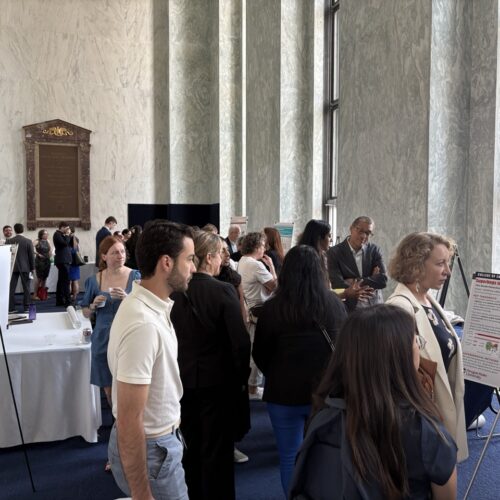Congressional Democrats host scientists whose grants have been canceled.
Like a research conference, but focused on research that may never happen now. Credit: John Timmer
Washington, DC—From a distance, the gathering looked like a standard poster session at an academic conference, with researchers standing next to large displays of the work they were doing. Except in this case, it was taking place in the Rayburn House Office Building on Capitol Hill, and the researchers were describing work that they weren’t doing. Called “The things we’ll never know,” the event was meant to highlight the work of researchers whose grants had been canceled by the Trump administration.
A lot of court cases have been dealing with these cancellations as a group, highlighting the lack of scientific—or seemingly rational—input into the decisions to cut funding for entire categories of research. Here, there was a much tighter focus on the individual pieces of research that had become casualties in that larger fight.
Seeing even a small sampling of the individual grants that have been terminated provides a much better perspective on the sort of damage that is being done to the US public by these cuts and the utter mindlessness of the process that’s causing that damage.
“It’s no way to do science,” one of the researchers told us.
Targeting diversity and more
While many of the scientists were perfectly willing to identify themselves at the event, more than one asked us not to name them in any coverage. Another noted that, while she wasn’t concerned about retaliation from the federal government, she was at a state university in a state with a Republican governor and so could still face problems. As a result, we’re not identifying any of the scientists we talked to in this article.
With a few exceptions, most of these scientists could only surmise why their research was cut. A couple of them were funded by programs that were meant to increase minority participation in the sciences and so were targeted as DEI. Another was at Harvard and saw his materials science research into new refrigerants canceled, ostensibly because Harvard hadn’t cracked down hard enough on campus antisemitism (“ostensibly” because the government has also issued a series of demands that have nothing to do with antisemitism).
In their rush to terminate grants, each agency settled on a single form letter that told researchers that their work was being defunded because it no longer reflected agency priorities. A number of said researchers surmised that they lost their support because, at the time the grant was initially funded, many federal agencies required attempts to, as the National Science Foundation termed it, “broaden participation.” This left them at risk of falling afoul of the new administration’s anti-DEI efforts.
A few of them planned to eliminate the language they suspect offended DOGE and send in a new grant request. But, given the lack of details in the termination letters, all of them would have to guess as to the problem. And at least one said that the entire program that had funded her grant had since been eliminated, so this wasn’t even an option.
Many of the grants were focused on STEM education, and it’s extremely difficult to imagine that people will be better off without the work happening. One involved figuring out how to better incorporate instruction in quantum mechanics into high school and college education, rather than limiting this increasingly important topic to a handful of physics specialists. Another was focused on trying to help engineers communicate better with the communities that would ultimately use the things they were designing (she cited Google Glass and the Segway as examples of the problems that result when this doesn’t happen).
A large multi-university collaboration had put together a program to help deaf students navigate careers in science, providing support at the undergraduate, graduate, and post-doctoral levels. The effort received multiple grants from different sources, but a number were part of a diversifying science effort, and all of those have been cut.
For a couple of the researchers present, the damage being done to the educational pipeline was personal: they had received prestigious grants that are intended to ease the transition between post-doctoral training and starting a faculty job. This funding helps them stay in a post-doctoral position long enough to develop a solid research program, then partially funds the process of starting up a lab to pursue that program. But for these researchers, the rug had been pulled out from under them partway through the process—funding that was cut even though (in one case) they were simply studying the regeneration of the retina in an experimental organism.
Pandemics, misinformation, and confusion
The damage is far from limited to education and diversity issues. Despite having been in power during a pandemic that ultimately killed well over a million Americans, the administration has decided that any pandemic-related work is not a priority. So, an entire pandemic preparedness program was scrapped. A pair of researchers was there to talk about the Antiviral Drug Discovery program (AViDD), which had been funded to develop drugs that target various emerging viral threats, such as coronaviruses and the families that include Ebola, Zika, and measles. The idea behind AViDD is to have treatments ready that could limit the spread of any new, threatening version of these viruses in order to give us time to develop vaccines.
AViDD had been funded to the tune of $1.2 billion, included nine dedicated research centers, and involved researchers at 90 institutions. In total, it had spent about half that money in developing 35 treatment candidates that targeted seven different viral families. And then the funding for the entire program was eliminated before any of those candidates could be pursued any further—the researchers likened it to building half a bridge.
Another area that has been targeted is misinformation research. One small team included an academic who’s also a Reddit moderator; they trained an AI model to flag posts that might require moderator intervention, potentially cutting down on the workload of human moderators, who are often volunteers. The project had gotten to the point where they were looking for a company willing to test the system on some user-generated discussions it hosted; now it’s on indefinite hold.
In other instances, it was hard to tell what had triggered the elimination of funding. One team was developing baseline data to allow us to track the presence of antibiotic resistance genes in municipal wastewater, which could be useful for various public health measures. It’s not entirely clear why that funding was canceled—possibly it was considered pandemic-related? The same uncertainty applies to a group of researchers who were trying to develop methods to identify which Arctic infrastructure projects would benefit the most people in Alaska. The researchers involved suspect their efforts to engage native communities probably triggered DOGE’s DEI filters, but they received the same form letter as everyone else.
Even when it was obvious why a given bit of research was cut, it didn’t feel any less stupid. One grant that was targeted funded research on prostate cancer in African Americans, which undoubtedly set off diversity alarms. But the researcher who had received it highlighted that, because of a complicated mix of genetics, environmental exposures, and occupational risks, prostate cancer is diagnosed at a 76 percent higher rate in African Americans, and they die because of it at twice the rate of whites. By stopping this sort of research, we’re committing to perpetuating these disparities, despite the administration’s rhetoric of eliminating racial preferences.
No way to do science
Although the likely loss of a large amount of interesting science is obviously a major problem, in many ways the uncertainty is worse. A number of the people there had seen funding restored due to temporary restraining orders issued in response to a number of lawsuits. But they couldn’t be confident that the money wouldn’t go away again due to a different ruling during the appeals process. And, even if they were to prevail in the courts on the initial cancellation, there were already fears that the government would think of some other justification to try to take the money away a second time.
The uncertainty makes it impossible to plan any significant distance ahead or hire anyone to do the work for longer-term projects. Many researchers are starting to write grants targeting non-federal funding sources, increasing the competition for that money and making it less likely that the effort will have any payoff.
Looming over all of this are the huge research cuts in the recently passed budget, which will cripple many of the agencies involved here starting in the next fiscal year. This raises questions about how much of this money might ever come back, even if the grants were reformulated to get past whatever issue got them cut.
Is there anything to be done? The event was being put on by the Democrats on the House Science Committee, and one of their members tried to offer some hope for the long-term situation. “Many of us on this committee are going to fight to claw back some of these cuts,” said Representative April McClain Delaney of Maryland. But that would require some cooperation with Republicans in the House and Senate, who hold a decisive number of votes and have so far seemed comfortable with the cuts to science funding. And they’d need to find a bill to attach it to that Trump would feel compelled to sign.
But that’s the future. For now, nobody offered much hope for the grants that are currently being targeted—after all, Congress had already given the federal government the money and, in many cases, directed it to spend it on these issues. At this point, the most scientists can hope for is that the US legal system ultimately acknowledges that the decision to cut their funding runs afoul of these congressional directives. And that may take years to be resolved.
John is Ars Technica’s science editor. He has a Bachelor of Arts in Biochemistry from Columbia University, and a Ph.D. in Molecular and Cell Biology from the University of California, Berkeley. When physically separated from his keyboard, he tends to seek out a bicycle, or a scenic location for communing with his hiking boots.






